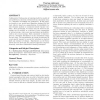Free Online Productivity Tools
i2Speak
i2Symbol
i2OCR
iTex2Img
iWeb2Print
iWeb2Shot
i2Type
iPdf2Split
iPdf2Merge
i2Bopomofo
i2Arabic
i2Style
i2Image
i2PDF
iLatex2Rtf
Sci2ools
114
click to vote
SIGIR
2003
ACM
2003
ACM
Collaborative filtering via gaussian probabilistic latent semantic analysis
Collaborative filtering aims at learning predictive models of user preferences, interests or behavior from community data, i.e. a database of available user preferences. In this paper, we describe a new model-based algorithm designed for this task, which is based on a generalization of probabilistic latent semantic analysis to continuous-valued response variables. More specifically, we assume that the observed user ratings can be modeled as a mixture of user communities or interest groups, where users may participate probabilistically in one or more groups. Each community is characterized by a Gaussian distribution on the normalized ratings for each item. The normalization of ratings is performed in a user-specific manner to account for variations in absolute shift and variance of ratings. Experiments on the EachMovie data set show that the proposed approach compares favorably with other collaborative filtering techniques. Categories and Subject Descriptors H.3.3 [Information Stor...
Collaborative filtering Aims | Probabilistic Latent Semantic Analysis | SIGIR 2003 | User Preferences |
Related Content
| Added | 05 Jul 2010 |
| Updated | 05 Jul 2010 |
| Type | Conference |
| Year | 2003 |
| Where | SIGIR |
| Authors | Thomas Hofmann |
Comments (0)

